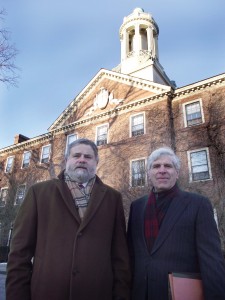The landmark Pegasus statues still buttress the cupola of the former Reader”™s Digest Association headquarters at Chappaqua. The severely downsized and relocating company left behind its corporate icon because the winged statues were too costly to take down and transport, said a property manager there.
The company”™s bankruptcy plan, approved one year ago, allowed their removal and also allowed RDA to pull out of its long-term leases for about 287,000 square feet of space with the owners of Chappaqua Crossing.

The landmark red-brick building that Reader”™s Digest founders DeWitt and Lila Wallace built sits silent and empty at the start of the new year. Only unclaimed office furniture remains in the desolate workplace after Reader”™s Digest in December closed the final chapter of its 70-year history there and moved the last employees to new global headquarters in midtown Manhattan and additional office space in downtown White Plains.
Town approval process causing delays
The silence and vacancy at the town of New Castle”™s largest tax-paying property could last much longer, as a proposal by Connecticut-based partners in Summit Greenfield to adaptively reuse and rezone their 114-acre campus for commercial and residential development is mired in the town approval process.
The underused property, for which partners at Summit Development L.L.C. and Greenfield Partners L.L.C., paid $59 million in 2004, could be economically costly to the town and local school district and New Castle taxpayers in the form of drastically reduced property tax revenues and potential lawsuits, attorneys for Chappaqua Crossing”™s frustrated developers recently warned.
Steamed at the town board”™s “glacial pace” in an environmental review of the mixed-use project proposed by Summit Greenfield, the attorneys in a recent letter to town board officials demanded they act to move the project forward by the end of the first quarter of 2011.
Summit Greenfield sustaining ”˜real damages”™
Attorneys Stephen L. Kass and John S. Marwell warned New Castle officials that “this is not some land-use or civics game in which our client will be toyed with by a board hoping to placate a recalcitrant public.” Summit Greenfield already has made “real investments” to make the property productive again and has sustained “real damages” because of the “glacial pace at which the town board has moved in reviewing this project,” the attorneys wrote.
After three years of project revisions and public hearings and meetings, Kass said the town board was on track to approve a final environmental impact statement for the Chappaqua Crossing project by the end of 2010. But at a Nov. 30 work session, “They essentially were pulling the rug out on the project and undoing all of the work of the previous three years,” he said. “We had no choice but to act.”
The town board at that meeting passed a lengthy resolution that required the developer to provide more information for the environmental impact statement and expressed the board”™s desire to work with the developer to “efficiently and expeditiously” complete the process. Town officials, though, said they were concerned the developer had not addressed critical issues regarding the property”™s proposed commercial use and rezoning to allow for multiple office tenants and the developer”™s modified proposal to build 199 condominium units, including 20 affordable-housing units, in what would be the town”™s first multifamily planned district.
Going back to square one?
Kass in response said the town”™s leadership “appears to have joined with those who by their actions seek to preserve the town”™s exclusionary past while undermining the viability of its largest commercial property and frustrating the town”™s stated goals of providing needed market rate housing for seniors, affordable housing for families and expanded recreational facilities for all town residents.”
“The town has essentially threatened to go back to square one,” said Kass. A pioneering attorney in New York environmental law at Carter Ledyard & Milburn L.L.P. in Manhattan, Kass said the state”™s environmental review process “has been abused here.”
“It”™s hard to understand how this is consistent with a property owner”™s due process rights,” said Marwell, partner at Shamberg Marwell Davis & Hollis P.C. in Mount Kisco. In New Castle, “The goal posts keep changing.”
Summit Greenfield already has millions invested
Summit Greenfield already has invested a few million to several million dollars in the project. The developer also pays the town”™s costs to retain consultants and attorneys for the Chappaqua Crossing application. “The town is very fortunate that Summit Greenfield has been able to sustain this process as they have,” said Marwell. He said other developers in the current economic climate lack the resources and willingness to stay with a project that has encountered numerous municipal obstacles and delays since plans were first presented in 2005.
Though the commercial office space is 80 percent vacant with RDA”™s completed departure, Chappaqua Crossing”™s owner paid approximately $1.5 million in total real property taxes in 2010, Marwell said. Now, though, Summit Greenfield”™s attorneys are pursuing tax certiorari claims against the town and seeking approximately $1.56 million in tax refunds and approximately $12.6 million in reduced property assessments for 2008 and 2009. Kass said the developer held off on those court proceedings while the Chappaqua crossing project went through the approval process. The landlord also plans to seek a tax refund of $810,000 for 2010.
“They have made the property unmarketable commercially,” Kass said of town officials.
Town of New Castle Supervisor Barbara Gerrard did not return a call for comment.


















